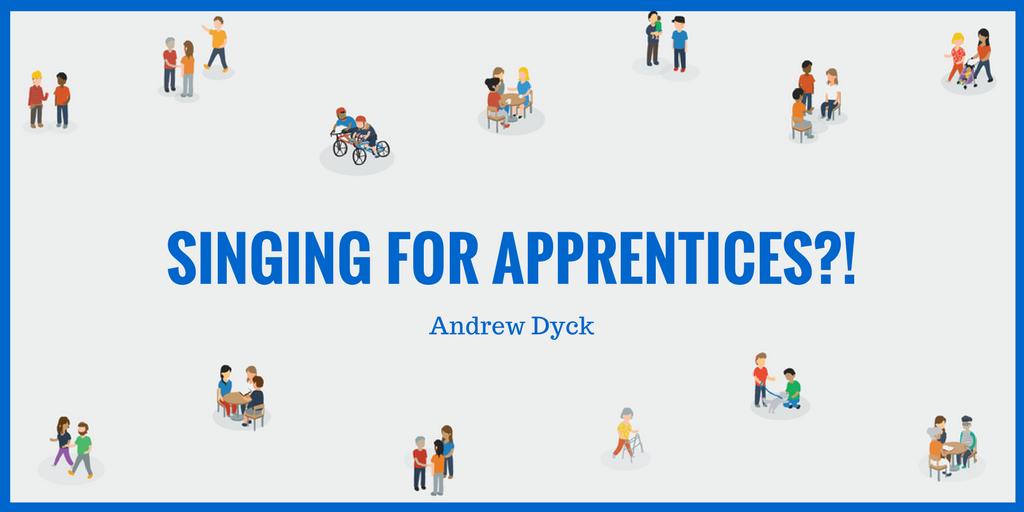Singing for Apprentices?!
 "Why are you going to seminary to study worship? All a song leader needs to do is open the hymnal and choose 3 songs."
"Why are you going to seminary to study worship? All a song leader needs to do is open the hymnal and choose 3 songs."
My aunt said this to me just before my family and I moved to Eastern Mennonite Seminary in 1994. I was pursuing a church leadership degree with a focus on congregational worship and music. My wife and I have often chuckled about her words. Yet they stay with me for two reasons. First, I'm sad that my aunt didn't understand what I wanted to learn. Second, I think congregational singing is often an underappreciated means of forming one another as Jesus' apprentices.
In November, Mennonite Brethren from across Canada will meet in Abbotsford for the biennial Equip Study Conference. This year's theme is "Transforming Discipleship." According to the preparatory materials, "A growing disciple is one who is being transformed in such a way that the deeds of Jesus, done in the power of Jesus, become an increasingly natural way of life." Simply put, a disciple is an apprentice of Jesus.
According to Paul in the New Testament, believers gather regularly to build up the church and each other (1 Corinthians 14). Another writer teaches that believers meet to provoke each other to love and to do good deeds; they also meet to encourage each other (Hebrews 10:24-25). Since singing has been a part of Christian meetings since the church began (cf. Ephesians 5:19a), I'm prompted to ask, "How does singing build up the church? And how does singing train apprentices?"
During the history of the Mennonite Brethren church (to which I belong), congregations have sometimes limited their singing to specific styles of music. In the early 1860s, a handful of house churches only permitted singing that was loud, vigorous, and accompanied by tambourines and dancing. A few decades later, congregations only sang a cappella. When my aunt spoke to me, her congregation sang in four-part harmony accompanied by piano and electric organ. In recent decades, many Mennonite Brethren churches sing only in the “praise and worship” genre. This raises another question: “How does the genre of a congregation’s singing shape, or misshape, Jesus’ apprentices?”
I have many more questions that I would love to see Mennonite Brethren churches and leaders consider:
- How does apprenticeship differ when song texts use Scripture, or when they are composed after 1500, or after 2010? And what happens when the texts are in first, second, or third person—that is, I and me; you and y'all; or he, she, and it?
- How does apprenticing differ when the music is artistically beautiful? or when the words are written poetically?
- What happens when the music's genre and accompaniment complement the text? or when they clash (I'm thinking of a congregational song with majestic words and lighthearted music). And what happens when the song's music fits with the song’s origins, or not?
- How would apprenticing change if songs went beyond praise and worship to express as much of human experience as the Psalms do? or as many themes as in a church's Confession of Faith or outlines of discipleship?
- How does apprenticeship happen differently when "participation" in singing means being inwardly moved or inspired in some way by the singing during a service (whether I sing or not), or when it means doing a bodily, mental, and spiritual activity at the same time as everyone else around me?
In short, what has singing to do with discipleship? I'd love to talk with about this with others at the Equip Study Conference (including during the workshop I’ll be leading).
Andrew Dyck (PhD cand.) is Assistant Professor of Ministry Studies at MB Seminary at Canadian Mennonite University. He will be a presenting a workshop at Equip 2017 Study Conference: Transforming Discipleship called "Singing as Discipleship: Gifts and Pitfalls".
